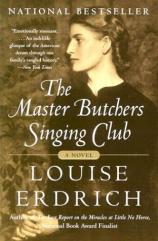About the Book
About the Book
The Master Butchers Singing Club

While set, like much of Erdrich's work, in her native North Dakota, The Master Butchers Singing Club is largely centered around the European-Americans who settled the desolate plains, rather than the reservation-dwelling Native Americans about whom she often writes. Bracketed by the two world wars, Erdrich's multi-generational, character-rich story chronicles a group of ordinary small-town denizens as they encounter the extraordinary events--both in their insular world and in the larger world, too--that come to define their lives.
Having seen his best friend slaughtered in the trenches of World War I, Fidelis Waldvogel trudges back to Germany, his first mission to tell the dead man's fiancée the devastating news. When he arrives at Eva Kalb's house, Fidelis discovers that she is pregnant and, feeling almost as if he has become some part of the friend who died on the battlefield, he offers to marry her. With Eva, he begins to push back the horrific memories of what he has seen and done in the war and learns that he is meant to love.
Fleeing post-war poverty, Fidelis emigrates to America, his sights set on Seattle. A butcher by trade, the new immigrant is armed with a suitcase bearing only knives and a generous supply of sausages that he plans to sell to pay his fare. The sausages take him only as far as Argus, North Dakota, an unassuming town on the plains. Eva and her son, Franz, soon join him, and through relentless hard work, the Waldvogels establish a toehold in their new land. Fidelis, who sings like an angel, even starts a singing club among the men of the town. Eva gives birth to three more sons--Markus, and the twins Emil and Erich.
At about the same time, Delphine Watzka arrives back in Argus after touring the Midwest with Cyprian Lazarre as a sideshow performer. Though Cyprian loves Delphine, he is homosexual, and the two have settled into a complicated, uneasy domesticity. Delphine has been hesitant to return to Argus, where she long ago abandoned her drunken father, Roy. But when she and Cyprian get there, they make a horrible discovery that will tie them to the place. Beneath the floorboards of her father's house are the fetid, rotting corpses of a family that disappeared years before. Roy, it seems, has been too drunk even to realize the source of the horrible smell. Delphine all but burns down the house in an effort to purge it of its odor, but the question persists: who is responsible for the family's death?
Most persistent in finding the answer is the sheriff, Albert Hock. Intoxicated by his own sense of importance, Hock uses his power of intimidation to try to insinuate himself into the romantic good graces of Delphine's friend Clarisse. But Clarisse, who is the local undertaker, will have nothing to do with the supercilious young man. When she later kills Hock while warding off his advance, Clarisse is forced to disappear from town, leaving the already solitary Delphine even more on her own.
Delphine begins to work at the butcher shop and she becomes fast friends with Eva. As Eva painfully succumbs to cancer, Delphine nurses her with vehement tenderness. She locks horns with Fidelis's jealous sister, Tante, who, with Teutonic arrogance, withholds Eva's morphine. Surprisingly, it is Roy who rallies from his perpetual drunkenness to steal some of the drug for the dying woman. Eva's death proves a catalyst that temporarily cures Roy of his alcoholism. It also precipitates major changes in Delphine's life, as she has promised to take care of Eva's boys, and implicitly vows to take care of Fidelis as well.
Carrying out this trust will further pit Delphine against Tante, who has her own designs for the family. Markus, the most like Eva and Delphine's favorite, flees the home behind the butcher shop and moves in with Delphine and Cyprian. Markus has been scarred by the death of the girl he loved, one of those found beneath the floorboards of Roy's house. Franz, Eva's eldest son, spurns the love of Mazarine Shimek, a dirt poor local girl he has loved since childhood. As the 1930's wane, Tante convinces Fidelis that she should take the twins back to Germany. Delphine fights this decision, but only through the intervention of fate will she prevent Markus from the going on the journey. With Tante gone, and Cyprian having hit the road once more as a sideshow performer, Fidelis and Delphine are freed at last to consummate their long-simmering passion, and they marry.
As America becomes involved in World War II, Franz's love of piloting airplanes leads naturally to his enlistment in the Air Corps. Markus also enlists. Across the Atlantic, Erich and Emil are conscripted into the German army and the singing butcher, still haunted by his own time in the trenches, watches helplessly as his sons don opposing uniforms in another senseless war.
On the periphery of the drama, an old woman called Step-and-a-Half scours the back alleys of Argus for scrap iron and discards. Her own past, steeped in violence and despair, is a mystery to the townspeople. But she alone knows one secret--the truth about Delphine's origins that brings the novel to a startling and dazzling close.
The Master Butchers Singing Club
- Publication Date: August 29, 2012
- Genres: Fiction
- Paperback: 416 pages
- Publisher: Harper Perennial
- ISBN-10: 0060935332
- ISBN-13: 9780060935337








